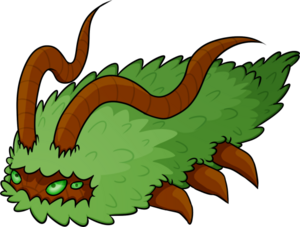Cloaked Shrubstalker: Difference between revisions
imported>Keileon mNo edit summary |
imported>Keileon mNo edit summary |
||
| Line 17: | Line 17: | ||
|Release= | |Release= | ||
|Artist=[[Wymsical]]}} | |Artist=[[Wymsical]]}} | ||
The '''Cloaked Shrubstalker''' is a [[Very Common]]creature released on Protochroma. It is found only in the [[Forested Laboratory]] and its associated Regular Delve, the [[Laboratory Depths]], in which it may only be encountered via triggering a trap while inspecting a Small Berry Bush. Its standard variant is Bronze. | The '''Cloaked Shrubstalker''' is a [[Very Common]] creature released on Protochroma. It is found only in the [[Forested Laboratory]] and its associated Regular Delve, the [[Laboratory Depths]], in which it may only be encountered via triggering a trap while inspecting a Small Berry Bush. Its standard variant is Bronze. | ||
==Descriptions== | ==Descriptions== | ||
Revision as of 06:37, 16 May 2021
The Cloaked Shrubstalker is a Very Common creature released on Protochroma. It is found only in the Forested Laboratory and its associated Regular Delve, the Laboratory Depths, in which it may only be encountered via triggering a trap while inspecting a Small Berry Bush. Its standard variant is Bronze.
Descriptions
Baby
This round, leafy egg is much heavier than its size lets on. It has what appears to be a thick vine or root coiled around it.
Juvenile
The egg has hatched into a pupa-like arthropod with long feelers and a leafy cloak. Such an appearance means it's well adapted to camouflaging itself in foliage, meaning that keeping it within of one's range of sight when it's outside is important. If frightened it usually opts to hide, even if it cannot blend into its current surroundings very well, if at all. When left be, it will idly inch from place to place, even going up onto walls and ceilings. Trees and branches, or anything close enough to those two things, are favoured perching spots.
Adult
Widespread in forested areas, Cloaked Shrubstalkers are large in number but difficult to spot at a first glance. Their leafy cloaks hide them from potential predators quite well, and if disturbed their tiny legs can carry them with surprising speed. If there is no opportunity for escape, they will typically stand their ground by frantically crawling all over whatever is threatening them and lashing at it with their whip-like feelers. Unwitting individuals find themselves becoming an easy meal for a Demon Weed after being enticed by their lures. These arthropods are active at all times of day and, if left be, will pay no mind to researchers passing by.
In captivity they quickly become used to the presence of their handler, but can be nervous around people they don't recognise. Being only two feet long on average have led some researchers to teach them how to perch onto their backs. What would normally be a space one would use for carrying a backpack instead is utilised as a way to take advantage of a Cloaked Shrubstalker's impressive camouflage. The trust they keep in their handler means that even if a threat surfaces they are unlikely to flee.
Additional Lore
Delving
Laboratory Depths
| Image | HP | Spawn Conditions | Additional Notes |
|---|---|---|---|
 |
50 | Trap: Small Berry Bush | -- |
Images
| Image Type | Images | ||||||
|---|---|---|---|---|---|---|---|
| Baby |  |
-- | -- | -- | -- | -- | -- |
| Juvenile |  |
-- | -- | -- | -- | -- | -- |
| Common Adult |
 |
 |
 |
 |
 |
 |

|
| Rare Adult |
 |
 |
 |
 |
 |
 |

|
Trivia
- Shrubstalkers are part of Wymsical's "an isopod of every grouping" project, the second to release after the Horned Tidewatcher. In this case, they use the Flora grouping.


